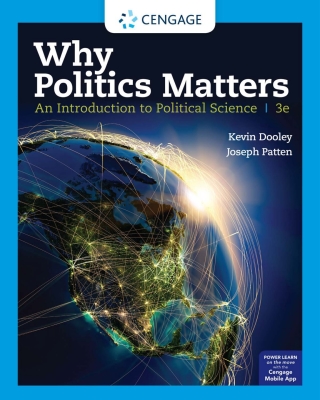Buy Why Politics Matters: An Introduction to Political Science, 3rd Edition PDF ebook by author Kevin L. Dooley; Joseph N. Patten – published by Cengage Learning in 2021 and save up to 80% compared to the print version of this textbook. With PDF version of this textbook, not only save you money, you can also highlight, add text, underline add post-it notes, bookmarks to pages, instantly search for the major terms or chapter titles, etc.
You can search our site for other versions of the Why Politics Matters: An Introduction to Political Science, 3rd Edition PDF ebook. You can also search for others PDF ebooks from publisher Cengage Learning, as well as from your favorite authors. We have thousands of online textbooks and course materials (mostly in PDF) that you can download immediately after purchase.
Note: e-textBooks do not come with access codes, CDs/DVDs, workbooks, and other supplemental items.
eBook Details:
Full title: Why Politics Matters: An Introduction to Political Science, 3rd Edition
Edition: 3rd
Copyright year: 2021
Publisher: Cengage Learning
Author: Kevin L. Dooley; Joseph N. Patten
ISBN: 9780357137468, 9780357137543
Format: PDF
Description of Why Politics Matters: An Introduction to Political Science, 3rd Edition:
Packed with current, global examples, Dooley/Patten’s WHY POLITICS MATTERS: AN INTRODUCTION TO POLITICAL SCIENCE, 3rd edition, explains why politics is important to you — and how you can get involved. It gives you the building blocks to understand political science and provides a “”big picture”” of the field as it explores political theory, comparative politics, the U.S. government and international relations. Thoroughly up to date, it covers the rise of populism, nationalism, Brexit, the Trump presidency, U.S. relations with North Korea and China, the “”pink wave”” in the 2018 Congressional midterms, the impact of climate change on international relations and more. In addition, exercises throughout prompt you to think critically about chapter concepts and put what you learn into practice.Important Notice: Media content referenced within the product description or the product text may not be available in the ebook version.
Table of Contents of Why Politics Matters: An Introduction to Political Science, 3rd Edition PDF ebook:
CoverDedicationBrief ContentsContentsPrefaceFeatures That Teach Theory and PracticeWhy Politics Matters to You!AcknowledgmentsAbout the AuthorsChapter 1: Why Politics MattersIntroduction: What Is Political Science? Political Science as the Study of Power Political Science as an Academic Discipline SummaryChapter 2: Ancient Political TheoryIntroduction: How Ancient Political Thought Impacts Us Today The Ionians The Sophists Socrates Plato Aristotle SummaryChapter 3: Modern Political TheoryIntroduction: The Origins of Modern Political Thought Niccolo Machiavelli Thomas Hobbes John Locke SummaryChapter 4: The American GovernmentIntroduction: The Origins of American Democracy The Articles of Confederation: The Failed Experiment The Constitutional Convention The Growth of Federal Power Ratifying the Constitution Adopting the ConstitutionAmending the ConstitutionSummaryChapter 5: Nationalism and Populism in the United States and AbroadIntroduction: The Underlying Causes of Nationalism and Populism The Emergence of Nationalism and Populism in the United States Political Tribalism and Presidential Politics Impact of Populism and Nationalism on U.S. Immigration Policy Nationalism and Populism in Europe SummaryChapter 6: Comparing LegislaturesIntroduction: The Importance of National Legislatures The Creation of the American Congress Congressional Decision Making Presidential versus Parliamentary Systems of Government Bicameral versus Unicameral Legislatures SummaryChapter 7: Comparing Democratic ExecutivesIntroduction: Executives: Presidents and Prime Ministers Presidents: The Pros and Cons of Independent Executives Debating the Executive: Rule by Individual or Executive Council The Constitution and the Powers of the American President The Prime Minister: First among Equals Looking Ahead: Newer Democracies in Comparative Context SummaryChapter 8: Comparing Judicial SystemsIntroduction Judicial Review versus Legislative Supremacy Judicial Review in the United States The American Judiciary and Federalism The Supreme Court’s Role in Expanding Civil Rights Germany: A Good Model for Comparison SummaryChapter 9: Authoritarian StatesIntroduction: Authoritarianism, Power to the . . . Rulers! Authoritarianism: Intellectual and Religious Justifications Modern Justifications: Power and Security General Characteristics of Authoritarian Regimes Contemporary Authoritarianism: Saudi Arabia, North Korea, and China SummaryChapter 10: Understanding International Relations: Terms and TheoriesIntroduction: International Relations Classic Realism: Power in International Relations From Classic Realism to Structural Realism: Morgenthau to Waltz Liberalism Radicalism: Marxism-Leninism, Dependency Theory, and Neo-Marxism Constructivism: We Shape Our Own Experiences about the World SummaryChapter 11: War, Diplomacy, and the Beginning of International RelationsIntroduction: Understanding the Past to Make Sense of the Present Why Europe? An Important Question to Begin Raison D’etat: A New Understanding of International Relations Balance of Power and the Rise of the State System The Nineteenth Century and the Concert of Europe: Preemptive Balance of Power Bismarck, the Rise of Germany, and the End of the Concert of Europe Collective Security: The League of Nations and the Outbreak of World War II Correcting the League and Confronting a New World: The United Nations and the End of World War II SummaryChapter 12: Competing Visions for the Future of International RelationsIntroduction: Contemporary International Relations Nuclear Security and Cold War Politics: Containment and Deterrence The Last Days of Communism and the Soviet Union Post-Cold War Instability: Globalization and the Rise of the Nonstate Actor The Verdict on Globalization: The Good and the Bad SummaryGlossaryNotesIndex





